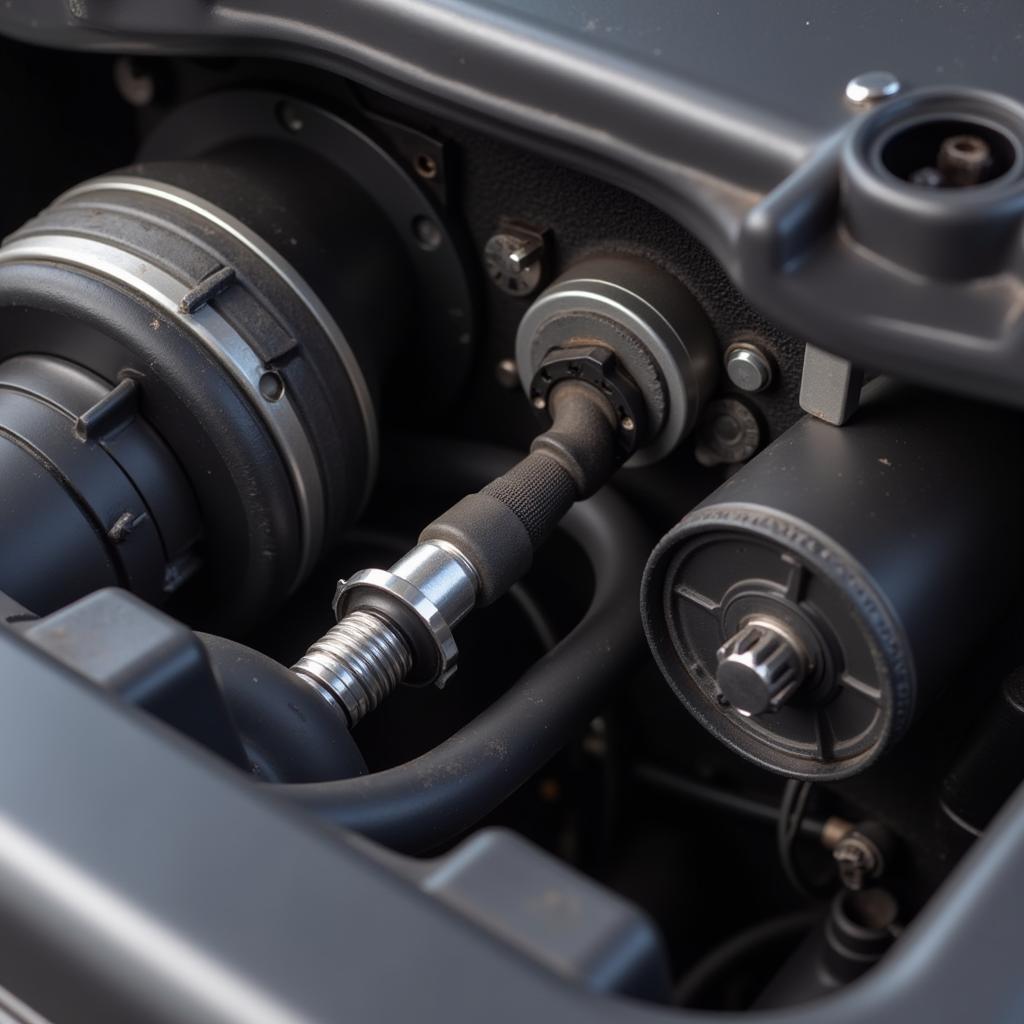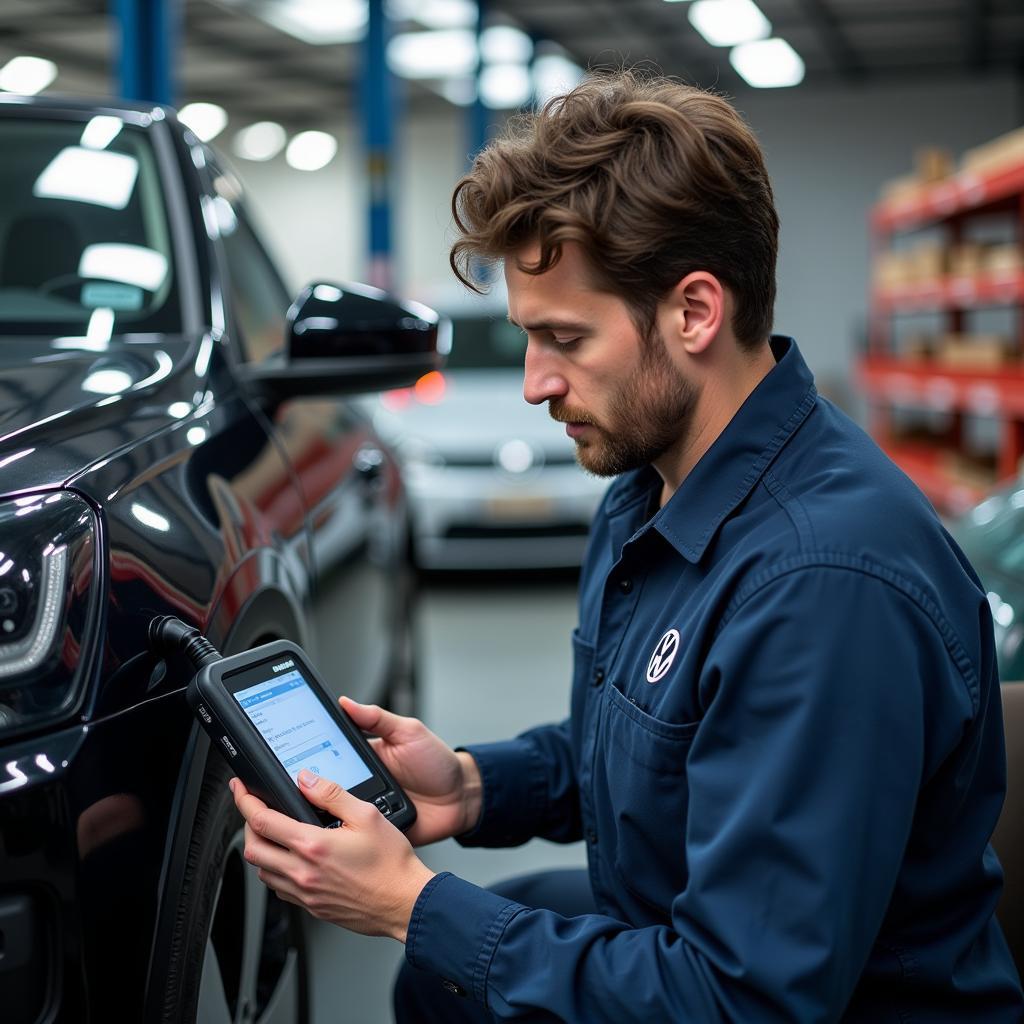Your cart is currently empty!

Understanding and Fixing Error Code P0130 on Your VW
A “Check Engine” light flashing on your dashboard is never a good sign, especially when it comes with the cryptic error code P0130. If you own a Volkswagen and encounter this code, it indicates a problem with your oxygen sensor, specifically Bank 1 Sensor 1. This guide will help you understand what this code means, its potential causes, and the steps to resolve it.
What Does Error Code P0130 Mean?
Your car’s engine relies on a precise air-fuel mixture for optimal performance and fuel efficiency. The oxygen sensor (O2 sensor) plays a vital role in this process. It monitors the oxygen levels in the exhaust stream and relays this information to the Engine Control Unit (ECU). The ECU uses this data to adjust the air-fuel ratio accordingly.
Error code P0130 specifically points to a problem with the O2 sensor located before the catalytic converter on engine Bank 1, which is where cylinder #1 resides. The code indicates that the sensor is sending a signal to the ECU that the engine is running too lean or too rich for an extended period. This means the air-fuel mixture is off, which can lead to decreased performance, reduced fuel economy, and potential damage to your engine and catalytic converter if left unresolved.
Common Causes of Error Code P0130 in VWs
Several factors can trigger a P0130 error code in your VW:
- Faulty Oxygen Sensor (Bank 1, Sensor 1): The most common culprit is a malfunctioning O2 sensor. Over time, the sensor can become contaminated with exhaust gases, leading to inaccurate readings.
- Exhaust Leaks: A leak in your exhaust system before the O2 sensor can introduce fresh air into the exhaust stream, disrupting the sensor readings.
- Vacuum Leaks: Similar to exhaust leaks, vacuum leaks in the engine intake manifold or associated hoses can disrupt the air-fuel mixture and trigger the code.
- Faulty Wiring or Connectors: Damaged, corroded, or loose wiring and connectors in the O2 sensor circuit can interrupt the signal transmission to the ECU.
- Fuel System Issues: Problems with the fuel pump, fuel injectors, or fuel pressure regulator can lead to an imbalanced air-fuel mixture, triggering the code.
- Faulty ECU: While less common, a malfunctioning ECU can also misinterpret sensor data and trigger the error code.
Troubleshooting and Fixing Error Code P0130
Before replacing any parts, it’s crucial to diagnose the root cause of the problem accurately. Here’s a step-by-step guide:
- Read the Error Code: Begin by verifying the error code using an OBD-II scanner. This will confirm if P0130 is the only code present or if there are other related codes.
- Inspect for Visual Damage: Visually examine the O2 sensor wiring harness and connector for any signs of damage, corrosion, or looseness. Repair or replace any damaged components as necessary.
- Check for Exhaust Leaks: Start your engine and listen carefully for any hissing sounds, especially near the exhaust manifold, downpipe, and around the O2 sensor. Address any leaks found.
- Inspect for Vacuum Leaks: With the engine running, listen for any hissing sounds that may indicate a vacuum leak. A common method is to spray carburetor cleaner around potential leak points – a change in engine RPM suggests a leak.
- Test the O2 Sensor: If visual inspections and leak checks don’t reveal the problem, the next step is to test the O2 sensor’s voltage output using a multimeter. Consult your vehicle’s repair manual for the specific testing procedure and acceptable voltage ranges.
- Check Fuel System Components: If the O2 sensor tests fine, move on to inspect the fuel system components for proper operation. This includes checking fuel pressure, testing fuel injectors, and inspecting the fuel filter.
- Consider ECU Issues: If all other components check out, a faulty ECU might be the culprit. In such cases, it’s best to consult a qualified mechanic or dealership for diagnosis and repair.
 VW Oxygen Sensor Location
VW Oxygen Sensor Location
When to Consult a Professional Mechanic
While you can tackle some of these troubleshooting steps independently, certain situations warrant professional assistance. If:
- You’re uncomfortable working with automotive electrical systems
- You’ve followed the troubleshooting steps and the problem persists
- You suspect a faulty ECU
It’s best to take your VW to a trusted mechanic or dealership specializing in Volkswagen repairs. They have the expertise, specialized tools, and experience to diagnose and fix the problem accurately.
 VW Mechanic Diagnosing Problem
VW Mechanic Diagnosing Problem
Conclusion
Ignoring a P0130 error code in your Volkswagen can lead to more significant and costly problems down the road. By understanding the code, its causes, and following the troubleshooting steps outlined in this guide, you can resolve the issue promptly and get back on the road with confidence. Remember, regular vehicle maintenance and timely repairs are key to keeping your VW running smoothly for years to come.
If you are located in Arvada, CO, our expert team at [Your Company Name] is always ready to assist you with all your Volkswagen repair needs. Contact us at +1 (641) 206-8880 and our email address: vcdstool@gmail.com or visit our shop at 6719 W 70th Ave, Arvada, CO 80003, USA, and let our certified technicians take care of your car.
Frequently Asked Questions
1. Can I drive my VW with a P0130 code?
It’s not advisable to drive for extended periods with a P0130 code. While the car might seem drivable initially, prolonged driving with a faulty O2 sensor can impact performance, fuel economy, and potentially damage your catalytic converter.
2. How much does it cost to replace an O2 sensor?
The cost of replacing an oxygen sensor can vary depending on your VW model and the labor rates in your area. Typically, you can expect to pay between $200 and $400 for parts and labor.
3. How long does it take to replace an O2 sensor?
Replacing an oxygen sensor is generally a straightforward procedure and can take anywhere from 30 minutes to an hour, depending on the sensor’s location and accessibility.
4. Can a bad catalytic converter cause a P0130 code?
While a bad catalytic converter can cause other error codes, it usually doesn’t directly trigger a P0130 code. However, a faulty O2 sensor, if left unaddressed, can eventually lead to catalytic converter failure.
5. How often should I replace my oxygen sensors?
Oxygen sensors have a limited lifespan and should be replaced according to your VW’s recommended maintenance schedule. Generally, they are good for around 60,000 to 90,000 miles.
by
Tags:
Leave a Reply